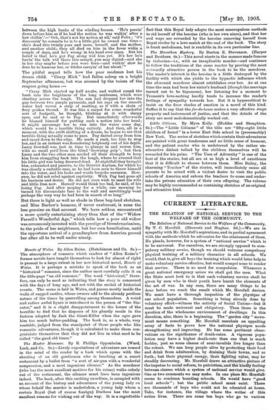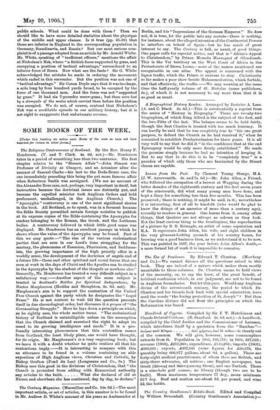CURRENT LITERATURE.
THE RELATION OF NATIONAL SERVICE- TO THE WELFARE OF THE COMMUNITY.
The Relation of National Service to the Welfare of the Community, By T. C. Horsfall. (Sherratt and Hughes. 6d) —We are in sympathy with Mr. Horsfall's aspirations, and in partial agreement with the methods which he advocates for the attainment of them, He pleads, however, for a system of "national service" which is to be universal. For ourselves, we are strongly opposed to com- pulsory military service, though we should welcome compulsory physical training of a military character in all schools. We would, that is, give all boys the training which would later help to make voluntary service effective, but would compel none to render that service. There is no need for compulsion. Whenever a great national emergency arises we shall get the men. What the State must look to is that such voluntary service shall be given by men who in their youth have learnt the elements of the art of war. In any case, there are many things to be done before we reach the result which Mr. Horsfall desires. We must have a thorough inspection of the physique of our school population. Something is being already done by voluntary effort—witness the activity of Social Unions—but it must be made universal and obligatory. Then there is the question of the wholesome environment of dwellings: In this direction, also, there is a beginning. The "garden city " move- ment means something. Mr. Horsfall marshals an appalling array of facts to prove how the national physique needs strengthening and improving. He has some pertinent obser- vations on the significance of death-rates. A vigorous popu- lation may have a higher death-rate than one that is much feebler, just as some classes of semi-invalids live longer than the robust. We can keep people alive by protecting their food and drink from adulteration, by draining their towns, and so forth ; but their physical energy, their fighting value, may be steadily decreasing. Mr. Horsfall draws an attractive picture of the impetus to social reform, to patricitism, andlEei kindly feeling, between classes which a system of national service would give. One or two comments we may make. In one place Mr. Horsfall seems to condemn boarding schools. He would have "good local schools " ; but the public • whoa must exist. There are thousands of boys who could not be educated, at home. Take, for instance, the village where the • writer of this notice lives. There are some tea boys who go to various public schools. What could be done with them ? Then we should like to have more detailed statistics about the physique of the middle and upper classes. Is it true (pp. 35-36) that these are inferior in England to the corresponding population in Germany, Scandinavia, and Russia? But our most serious com- plaint is of a passage adopted from an article by Mr. Arnold White. Mr. White, speaking of "inefficient officers," mentions the affair at Nicholson's Nek, where "a British force supported by guns, and occupying a position of tactical advantage," surrendered to an inferior force of Boers. Now what are the facts ? Sir G. White acknowledged the, mistake he made in ordering the movement which ended in this surrender. But the position was not one of "tactical advantage." Sir Conan Doyle says that it was too large, a mile long by four hundred yards broad, to be occupied by the force of one thousand men. And the force was not " supported by guns." It had six 7-pounder screw-guns ; but these were lost by a stampede of the mules which carried them before the position was occupied. Wo do not, of course, contend that Nicholson's Nek was a creditable episode in our military history, but it is not right to exaggerate that unfortunate reverse.







































 Previous page
Previous page